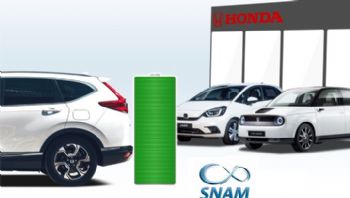
Honda Motor Europe is expanding its battery-recycling partnership with SNAM (Société Nouvelle d’Affinage des Métaux) to advance the ‘sustainable usability of its end-of-life traction batteries’. The pan-European arrangement will see SNAM collect batteries from Honda’s increasing number of hybrid and electric vehicles — and either prepare them for a ‘second life’ storing renewable energy or (if they are not suitable for that purpose) extract valuable materials from them for recycling.
Honda and SNAM have worked together since 2013 to ensure the traceability of end-of-life batteries and dispose of them in accordance with European Union (EU) environmental standards. The expansion of this agreement will see SNAM collect lithium-ion and nickel metal hydride (NiMH) batteries from Honda dealerships and Authorised Treatment Facilities in 22 countries, before analysing how suitable they are for recycling and then processing them accordingly.
Tom Gardner, Honda Motor Europe senior vice-president, said: “As demand for Honda’s expanding range of hybrid and electric cars continues to grow, so does the requirement to manage batteries in the most environment-friendly way possible.
“Recent market developments may allow us to use these batteries in a second-life application for powering businesses or — thanks to recent improved recycling techniques — to recover useful materials that can be used in the production of new batteries.”
When battery cells are damaged and unsuitable for ‘second-life’ applications, materials such as cobalt and lithium can be extracted by hydro-metallurgy techniques involving the use of aqueous chemistry.
They can then be re-used in the production of new batteries, colour pigments or as useful additives for mortar. Other commonly used materials — including copper, metal and plastics — are recycled and offered to the market.